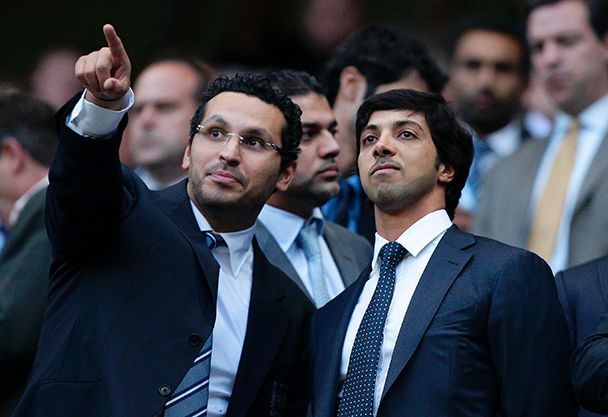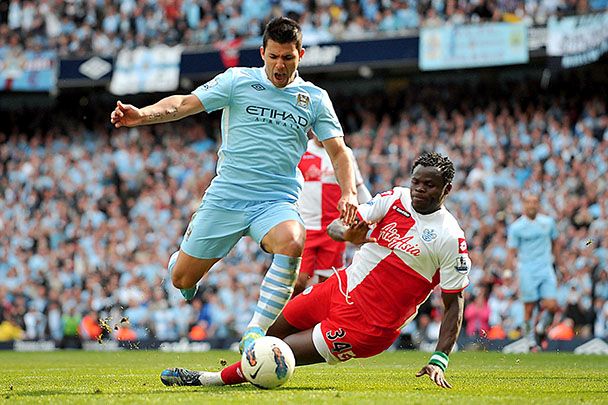5:02 pm | September 1, 2018 | Go to Source | Author:
“The biggest challenge, I think, was getting a seat at the table.” Al-Mubarak says, recalling the first 10 years of Abu Dhabi ownership at City. “That was the hardest thing. It quickly dawned on me that football in Europe had a main table, with a set of clubs, and that was the status quo.
“Breaking into that status quo was incredibly difficult, very challenging. Now it’s completely different, and we are now part of the establishment.”
English football had seen clubs transformed by financially powerful owners before Sheikh Mansour’s arrival, and the new kids on the block are rarely given the red carpet treatment by the old guard. Jack Walker, the steel magnate, transformed his hometown club Blackburn Rovers from faded also-rans into Premier League champions in the 1990s. Then along came Abramovich at Chelsea in 2003. Sir Alex Ferguson once accused Chelsea of being “hell-bent on ruining football” after the London club’s emergence as a new force in the game.
But no club has upset the elite quite like Manchester City. As we approach the 10th anniversary of Sheikh Mansour’s takeover, we reflect on a story of success, growth and spectacular off-field development in terms of the club’s state-of-the-art City Football Academy (CFA) and the City Football Group, which now consists of six clubs across the globe. The progress was rapid, with any mistakes and missteps eventually overshadowed by success and rising expectations. Now City embody an efficient — and efficiently ruthless — operation that mirrors their football on the pitch: everything, from player development to groundskeeper, is part of a plan to take the club forward.
In 2010, after a £120m summer recruitment of Yaya Toure, David Silva, James Milner and Mario Balotelli, Ferguson accused them of “kamikaze spending.” A year earlier, the United manager, feeling City breathing heavily down United’s neck, dismissed them as a “small club with a small mentality” after Carlos Tevez’s defection from Old Trafford to the Etihad, a move that was celebrated (or denounced, depending on your point of view) with the now infamous “Welcome to Manchester” billboard in the heart of the city.
But Tevez, more than any player including Robinho, made the football world take notice. Manchester City had truly arrived.
“Carlos was the one,” says Brian Marwood, a key member of the City hierarchy since his arrival in 2009. “With what surrounded it as well — coming from Manchester United, he came to City and the rivalry became a little bit more intense after it happened. I think everyone is aware of the billboard, which people still talk about now, but that was a moment in time when one of the early changes for good happened.
“He [Tevez] dragged people along with him and gave a lot of people belief that we could be successful.”

Manchester City chairman Khaldoon Al Mubarak tells ESPN about the club’s highs and lows of the last 10 years under Sheikh Mansour’s ownership.
City’s ambitious spending hasn’t come without a cost. In May, 2014, UEFA fined City £49m for violating financial fair play (FFP) and forced them to accept restrictions on their spending and the size of their Champions League squad, cut from 25 to 21 players — a penalty for breaking the European governing body’s financial strictures.
But in April, 2017, City were refunded £33m of their initial fine after subsequently complying with FFP regulations, underlining Al-Mubarak’s insistence that the club were playing the long game.
“The team needed transformation and ironically there was no talk of financial fair play [around 2008],” Brian Marwood, a Manchester City administrator, tells ESPN FC. “And ironically there was such accelerated growth we probably wouldn’t be able to do it now if the owners bought Manchester City.”
“The first stage, up to 2013 in that growth period that we had embarked upon, we had to pay premiums and go out of our way to attract the talent we wanted to Manchester City,” Al-Mubarak says. “But then two things happened — we started winning, and winning is a wonderful formula to attract, and secondly, the CFA was done.
“Ten years ago, what are you selling? You are a selling a dream or a vision, but there is nothing there. Now, you are the most successful club in the Premier League and consistently challenging in Europe. We have the best coach in the world, the best coaching staff, organisation and infrastructure. Now you have it, it sells itself, and I think we are far more in control of our destiny than we ever were.”

Al Mubarak, left, and Mansour, right, were early in the wave of new investment in football from the Gulf region. AP Photo/Jon Super
Sergio Aguero cost Manchester City £38m when he arrived from Atletico Madrid in the summer of 2011. Had City been able to push through a deal for Manchester United’s Wayne Rooney less than 12 months earlier, Aguero would almost certainly have gone elsewhere and who knows how the history of the club would have played out?
But Aguero and Manchester City are forever connected by his goal against Queens Park Rangers, after 93 minutes and 20 seconds, in the final game of the 2011-12 Premier League season. Without that goal, United would have won the title and the Premier League would have been denied its most memorable moment.
“The truth is that this memory will always stay with me,” Aguero tells ESPN FC. “It had been many years since City had won the league, so it is something that will always stay in the memory.
“I have scored important goals,” Aguero continues, “but I think that was one of the most important because, if we did not score, we lost the league. I thought that we were going to lose the title when we went 2-1 down. I thought it was over because we had to score two goals in six minutes. In my head, I thought, ‘I have to have one chance …’ but obviously I always think that, and sometimes I do not have it. And well, I just had an opportunity, one more chance …”
Bosnian forward Edin Dzeko equalised with a 90th minute header but with United having won 1-0 at Sunderland, City needed to score again. The sands of time were disappearing until Mario Balotelli found Aguero inside the penalty area.
“There are two seconds in which you have to decide what to do: shoot or continue the run a little bit more,” Aguero said. “At that time, I wanted to continue a little bit, thinking that maybe the defender would give away a penalty. But nothing … Then I continued, shot hard at the near post, and luckily it was a goal. I think that winning the league was a blow for other clubs in England and for other teams in Europe. That title was the beginning of this Manchester City.”
For Al-Mubarak, it was a moment in time.
“It was once in a lifetime and I don’t think most of us will ever get to see a thing like this where you win the Premier League in the last game of the season, in the final minute, having needed two goals, with your rival playing at same time having won the league technically two minutes earlier and you just win it. That entire drama, and winning our first title after so many years, was an important milestone.”

Aguero’s title-winning goal in 2012 was a seminal moment for Man City, proof that they could join the sport’s elite clubs. Ed Garvey/Manchester City FC via Getty Images
Through the Abu Dhabi era, City have signed some of the biggest stars in the game and come close to landing others — John Terry, Wayne Rooney, Eden Hazard and Neymar have all been pursued by the club at some point over the past 10 years — but the most important acquisition has been Guardiola. Not only a serial winner from his time as coach of Barcelona and Bayern Munich — three domestic titles in both Spain and Germany, plus two Champions League successes — the Catalan has also been one of the game great innovators, proving that fantasy football can also be winning football.
City’s progress under Abu Dhabi ownership up until they hired Guardiola in the summer of 2016 was uneven. But Guardiola, 47, has taken the club to a whole new level, as borne out by last season’s record-breaking title success, which saw City become the first club to amass 100 points in a Premier League season.
“I think Pep is the pinnacle of what we have been doing over the years,” City chief executive, Ferran Soriano, tells ESPN FC. “It [hiring him] was not an isolated decision and Pep has taken [the team] to the top level in terms of tactical sophistication and intensity. But it was part of a plan. We have been working on this idea for years.”
Soriano and City’s director of football, Txiki Begiristain, both recruited by Al Mubarak in 2012, worked closely with Guardiola at Barcelona, with the two men promoting the then-coach of the club’s B-team to the top job at the Nou Camp in preference to appointing Jose Mourinho to the position.
Soriano and Begiristain’s arrival at City was the first step in luring Guardiola to the Etihad, but Soriano insists that his appointment as manager was more than simply hiring a guy to deliver trophies. “Pep is very important for the club for two reasons,” Soriano said. “First, because he took us to the top in terms of beautiful football, but second, he will leave a legacy so when he leaves one day, the next coaches and administrators and fans will always remember what we are doing now as the benchmark. They will not accept less, and this is very important for the club.
“I have seen this happening elsewhere, like at Barcelona,” continues Soriano, “where they don’t accept less. I think this is what is going to happen at Manchester City. If we do well, and the next administrators do well, it will last for decades.”
Guardiola has already extended his City contract until the end of the 2020-21 season, and his importance to the club, if not already abundantly clear, was emphasised by the recent fly-on-the-wall Amazon documentary, “All or Nothing,” which showed clearly how he is the focal point of an increasingly slick and successful operation.
Simply put: Manchester City could be poised for a decade of dominance.
“We are now one of the top teams in England, which means one of the top teams in the world, and that will not change,” Soriano says. “Once you get to this level, you have to do some bad management to step back, and we will not do that.”

Powered by WPeMatico


